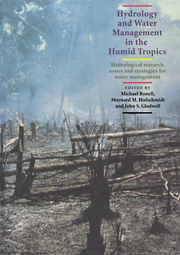 Hydrology and Water Management in the Humid Tropics
Hydrology and Water Management in the Humid Tropics Book contents
- Frontmatter
- Contents
- List of Authors
- Foreword by Federico Mayor, Director-General, UNESCO
- Preface
- Cartographic Credit
- Acknowledgements
- SECTION I INTRODUCTION
- SECTION II HUMID TROPICS SETTING
- SECTION III REGIONAL HYDROLOGY
- SECTION IV PHYSICAL PROCESSES
- SECTION V PHYSICAL PROCESSES – HUMAN USES: THE INTERFACE
- 17 Challenges in Agriculture and Forest Hydrology in the Humid Tropics
- 18 The Impact of Land-Use Change on Water Resources in the Tropics: An Australian View of the Scientific Issues
- 19 Urban Water Management Problems in the Humid Tropics: Some Technical and Non-Technical Considerations
- 20 The Management of Water Resources, Development and Human Health in the Humid Tropics
- 21 Water Supply and Health in the Humid Tropics with Particular Reference to Rural Areas
- SECTION VI MANAGEMENT ISSUES
- SECTION VII APPENDICES
- Place index
20 - The Management of Water Resources, Development and Human Health in the Humid Tropics
Published online by Cambridge University Press: 23 December 2009
- Frontmatter
- Contents
- List of Authors
- Foreword by Federico Mayor, Director-General, UNESCO
- Preface
- Cartographic Credit
- Acknowledgements
- SECTION I INTRODUCTION
- SECTION II HUMID TROPICS SETTING
- SECTION III REGIONAL HYDROLOGY
- SECTION IV PHYSICAL PROCESSES
- SECTION V PHYSICAL PROCESSES – HUMAN USES: THE INTERFACE
- 17 Challenges in Agriculture and Forest Hydrology in the Humid Tropics
- 18 The Impact of Land-Use Change on Water Resources in the Tropics: An Australian View of the Scientific Issues
- 19 Urban Water Management Problems in the Humid Tropics: Some Technical and Non-Technical Considerations
- 20 The Management of Water Resources, Development and Human Health in the Humid Tropics
- 21 Water Supply and Health in the Humid Tropics with Particular Reference to Rural Areas
- SECTION VI MANAGEMENT ISSUES
- SECTION VII APPENDICES
- Place index
Summary
ABSTRACT
Over the past twenty years, economists and planners have questioned the benefits of water supply, while other health interventions have competed with the water sector for resource allocation. This has created a credibility gap which the medical profession and sanitary engineers have had difficulty in bridging. Evaluation of the health impact of water management in tropical developing countries has likewise been excessively oriented towards adverse effects, further impeding the development of the necessary resources. Despite the momentum created by the International Drinking Water Supply and Sanitation Decade, coverage of the world population with supply services is far from satisfactory. Progress can hardly keep pace with the increase in population. The majority of rural people in poor tropical countries are not served and there is little prospect of achieving universal coverage in the foreseeable future. Moreover, the generalization of cost mechanisms may shift resources from other vital sectors (nutrition, health) and so offset the benefits of a safe water supply.
Innovative approaches can overcome the professional barriers between health specialists and decision-makers. The main health benefits accrue from the availability of unlimited quantities of water, whatever its quality. Unnecessarily stringent quality standards may be counter-productive since they may reduce the quantities available, delay the supply or increase its cost. Recycling waste water is a necessity to increase the resources, and appropriate health safeguards can be developed with respect to each usage category, depending on selected application techniques.
Finally, engineering techniques and nonmedical interventions in water management can be shown as the most cost-effective measures for controlling diseases of economic importance. Examples of dracunculiasis and onchocerciasis illustrate the point.
- Type
- Chapter
- Information
- Hydrology and Water Management in the Humid TropicsHydrological Research Issues and Strategies for Water Management, pp. 437 - 453Publisher: Cambridge University PressPrint publication year: 1993
